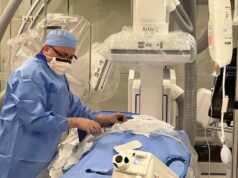This advertorial, sponsored by Siemens Healthineers, is intended for US readers only.
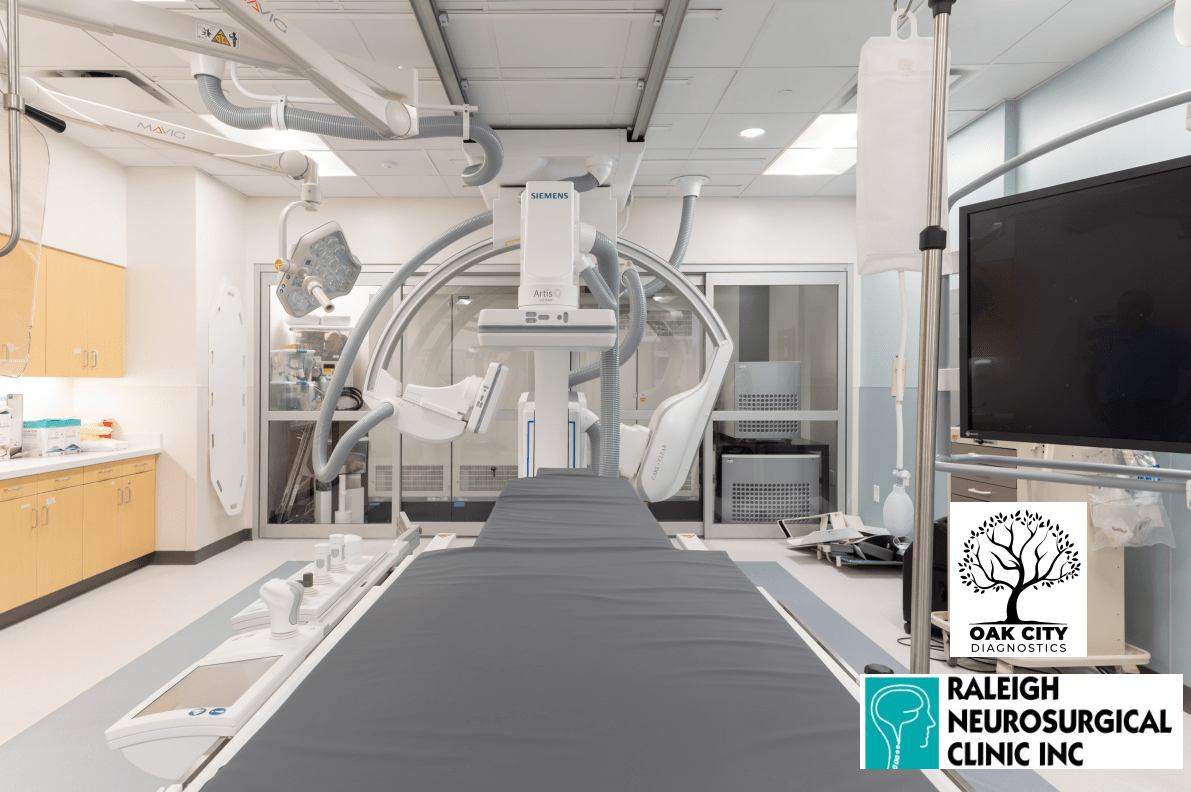 A neurosurgical clinic in Raleigh, USA recently opened an office-based lab (OBL)—specifically, the country’s first office-based endovascular neuro practice supported by a fixed biplane angiography system from Siemens Healthineers. Here, two leading figures from the clinic reveal why they were compelled to make this switch, and outline what it means to their patients.
A neurosurgical clinic in Raleigh, USA recently opened an office-based lab (OBL)—specifically, the country’s first office-based endovascular neuro practice supported by a fixed biplane angiography system from Siemens Healthineers. Here, two leading figures from the clinic reveal why they were compelled to make this switch, and outline what it means to their patients.
An office-based healthcare model is emerging as a viable, alternative option to traditional hospital settings. That model is called an OBL, and patients are turning to it with frequency for procedures that were previously done in the hospital. OBLs gained early popularity with vascular surgeons, cardiologists and interventional radiologists. They also gained traction in the space of endovascular neurointerventions—only doing so with technical limitations, however, due to mobile C-arm angiography equipment being used.
The opening of Raleigh Neurosurgical Clinic (Raleigh, USA) in August 2022—the first office-based endovascular neuro practice nationwide with a Siemens Healthineers fixed biplane angiography system—suggests that the tide is turning. Having leveraged advanced technology from Siemens Healthineers, principals at the clinic say the benefits are most evident in patient satisfaction, accessibility, and clinical outcomes.
“We may be among the first; however, people have been thinking about this for a long time,” says endovascular neurosurgeon Andrey Belayev. “They just had not figured out how to get it done. I suspect there will be a wave of OBLs focusing on endovascular neuro interventions in the future.”
Belayev was one of several neurosurgeons who had been contemplating a move to an OBL for years. His practice prides itself on treating patients with the most advanced and cost-effective endovascular techniques possible, and he and his team believed the patient benefits of performing endovascular neuro interventions in an OBL were too compelling to ignore. They had to find a way to make it work.
The importance of fixed C-arm technology
“We explored all options and visited sites where providers were moving angiography to an outpatient setting,” says Raleigh Neurosurgical Clinic CEO Jacob Rodman. “They were relying on mobile C-arms. We told ourselves that, if we were going to do this, we had to provide the best patient care possible. That meant committing to fixed C-arm biplane technology.”
The team turned to Siemens Healthineers to install an ARTIS Q biplane system due, in large part, to its exceptional image quality. A laser focus on what is best for patients is fundamental to Raleigh Neurosurgical Clinic and, for their OBL, the team created an experience that maximises patient and staff satisfaction while supporting clinical outcomes and reducing costs.
“The space we designed is amazing,” says Belayev. “Our patient wait time is minimal. One or two staff members walk them through the process, answering questions and keeping them comfortable through the entire procedure.”
Supporting accessibility and comfort
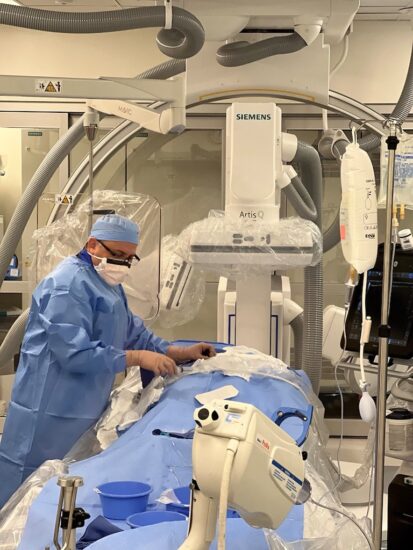
Efficiency—from scheduling to procedure—is fundamental to an OBL’s success. “I do not think you can overemphasise how efficient this space is,” says Rodman. “Patients are not going down one corridor for a procedure and through another area for recovery. They see their entire team right there. Patient steps and length of travel are all minimised.”
Belayev agrees, noting: “When patients navigate a hospital system, it can take 45 minutes to an hour to get where they need to be. They may meet 20 people before they see the surgeon. It is a long process that can be intimidating.”
In contrast, Raleigh Neurosurgical Clinic makes care more accessible and streamlines the clinical process. Patient scheduling is easier because diagnostic cases are scheduled in the OBL and more complex cases are performed at the hospital. About 99% of OBL cases are diagnostic cerebral angiographies and procedural times are significantly faster, which supports better patient and staff experiences.
“I hear interventional cardiologists in hospitals say their biggest challenge is getting cases done,” Belayev adds. “I get my cases done because I do my angiography in the OBL.”
Providing high-quality clinical experiences
Faster procedures are possible because the team has more control over scheduling, equipment, and staff hires.
“We select the equipment that is most efficient and effective,” says Belayev. “We do not have the red tape hospitals face. Many angiography systems in hospitals are older models, close to end of life, or work through companies not focused on reducing radiation exposure while maintaining good image quality. We are different. Our angiography system is equivalent or better than hospital angiography suites, which is amazing.”
Siemens Healthineers biplane technology offers patients additional advantages, according to Belayev. Patients receive half the contrast they would receive on a single C-arm or single-detector standalone system. Additionally, most procedures are done with a radial approach. This helps patients mobilise faster, reduces recovery times, and improves safety—and faster procedures help minimise radiation exposure.
Belayev has performed more than 100 diagnostic angiography procedures in the OBL. “Appropriate care is taking place in the appropriate site of service,” says Rodman. “Cases that can be done safely in the office are performed there. This frees up the hospital for more critically ill patients.”
“People do not want to go to hospitals in general, especially after COVID,” Belayev adds. “We provide a boutique-type experience. I routinely hear patients say it is refreshing. They park their car and walk in. We offer them snacks, drinks and iPads loaded with entertainment. Procedure times are fast, and people often tell me how nice our staff are. It is a personalised experience for them.
“We look forward to sharing our experiences at the 2023 Society of NeuroInterventional Surgery [SNIS] annual meeting [31 July–4 August, San Diego, USA].”
Foreshadowing the future of neurovascular care?
By developing its neurovascular OBL with a Siemens Healthineers biplane angiography system, Raleigh Neurosurgical Clinic represents a major advancement in outpatient care for neurologic disorders.
“By prioritising patient satisfaction, accessibility, and high-quality clinical experiences, we provide more accurate diagnoses and targeted treatments while minimising risks associated with radiation exposure and contrast use,” Belayev says.
It is an innovative approach that highlights the potential of OBLs in improving patient care and paves the way for advancements in neurovascular medicine.
Click here to learn more about fixed neuro angiography systems for OBLs: https://www.siemens-healthineers.com/en-us/angio/fixed-biplane-neurology-obl-systems.
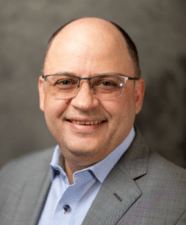 Andrey Belayev, an endovascular neurosurgeon at Raleigh Neurosurgical Center (Raleigh, USA), is board certified in neurosurgery. In addition to his clinical practice as a general neurosurgeon, he specialises in the treatment of neurovascular disorders including aneurysms, vascular malformations of the brain and spine, carotid artery stenosis, and the acute treatment of stroke. Belayev earned his medical degree at the University of Miami Miller School of Medicine (Miami, USA). He then completed his residency in neurosurgery at the University of Texas Health Science Center at San Antonio (San Antonio, USA), where he served as chief resident. He completed his fellowship training in open cerebrovascular surgery and endovascular neurosurgery at the prestigious Semmes-Murphey Clinic (Memphis, USA), and completed a fellowship and advanced clinical training in microvascular and endovascular neurosurgery with the World Federation of Neurological Societies in Nagoya, Japan. Belayev is the author of several peer-reviewed manuscripts and has been invited to present his research findings at respected clinical meetings around the world.
Andrey Belayev, an endovascular neurosurgeon at Raleigh Neurosurgical Center (Raleigh, USA), is board certified in neurosurgery. In addition to his clinical practice as a general neurosurgeon, he specialises in the treatment of neurovascular disorders including aneurysms, vascular malformations of the brain and spine, carotid artery stenosis, and the acute treatment of stroke. Belayev earned his medical degree at the University of Miami Miller School of Medicine (Miami, USA). He then completed his residency in neurosurgery at the University of Texas Health Science Center at San Antonio (San Antonio, USA), where he served as chief resident. He completed his fellowship training in open cerebrovascular surgery and endovascular neurosurgery at the prestigious Semmes-Murphey Clinic (Memphis, USA), and completed a fellowship and advanced clinical training in microvascular and endovascular neurosurgery with the World Federation of Neurological Societies in Nagoya, Japan. Belayev is the author of several peer-reviewed manuscripts and has been invited to present his research findings at respected clinical meetings around the world.
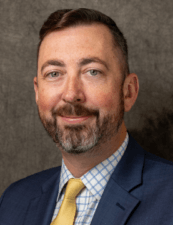 Jacob Rodman is the CEO for Raleigh Neurosurgical Clinic—a group that was established in 1954. Rodman has over 20 years of management experience encompassing leadership positions at every level. He is a past president and board member for the North Carolina Medical Group Managers Association (NCMGMA). He has also served on several advisory committees and boards for United Healthcare of North Carolina, Blue Cross and Blue Shield of North Carolina, the Town of Morrisville’s budget office, Medical Mutual Insurance Company, and Wake Monarch Academy. Rodman is currently president elect for the Neurosurgery Executive Resource Value and Education Society (NERVES). He is also a board-certified medical practice executive by the American College of Medical Practice Executives (ACMPE), and has presented both nationally and internationally on a variety of topics surrounding medical practice management and leadership.
Jacob Rodman is the CEO for Raleigh Neurosurgical Clinic—a group that was established in 1954. Rodman has over 20 years of management experience encompassing leadership positions at every level. He is a past president and board member for the North Carolina Medical Group Managers Association (NCMGMA). He has also served on several advisory committees and boards for United Healthcare of North Carolina, Blue Cross and Blue Shield of North Carolina, the Town of Morrisville’s budget office, Medical Mutual Insurance Company, and Wake Monarch Academy. Rodman is currently president elect for the Neurosurgery Executive Resource Value and Education Society (NERVES). He is also a board-certified medical practice executive by the American College of Medical Practice Executives (ACMPE), and has presented both nationally and internationally on a variety of topics surrounding medical practice management and leadership.
This is Part 1 of an OBL series highlighting the benefits for neurovascular procedures. See the next edition to hear Raleigh Neurosurgical Clinic talk about business and patient outcomes.
Disclaimer: The statements by Siemens Healthineers’ customers described herein are based on results that were achieved in the customer’s unique setting. Since there is no “typical” hospital and many variables exist (e.g. hospital size, case mix, level of IT adoption), there can be no guarantee that other customers will achieve the same results.

